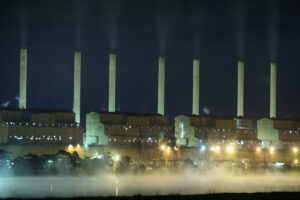The Con of Carbon Capture and Storage
Relying on carbon capture and storage to reduce emissions is like trying to empty a swimming pool with a thimble
There’s a lot of talk about carbon capture and storage (CCS).
The Federal Government loves it – Resources Minister Madeleine King called it the “single biggest opportunity for emissions reduction in the energy resources sector”. It sounds like it’s going great in the Northern Territory, Western Australia, South Australia and, two years ago, it was time to apparently celebrate, “Fifteen years of CCS success in Victoria”.
WOW. So much success!
Back in 2004, The Australia Institute didn’t think CCS would be a goer, but maybe we were wrong?
Well, let’s check the numbers.
According to the Global CCS Institute, at the end of 2022 there were 30 operating CCS projects in the world.
The. Whole. World.
These projects could sequester a grand total of 42.6 million tonnes of CO2 under the ground each year.
If you know your emissions numbers, you know that’s not a lot. As the first graph shows it’s less than a 10th of Australia’s 2022 emissions.
Or to put it another way, the entire world’s CCS capacity could capture the emissions of three Australian coal-fired power stations in Victoria’s Latrobe Valley.
Decades of government and industry support, many, many millions of taxpayer funds spent both here and throughout the USA, Europe, and Asia and what do we end up with? The entire globe’s CCS fleet is storing the emissions of Victoria’s Latrobe Valley power stations.
This sounds bad, but the reality is actually much worse.
This is nameplate capacity, not actual functioning capacity which tends to be much lower. As we discovered recently, the world’s biggest CCS plant operating off Australia’s north-west coast is running at a third capacity. Nameplate capacity also includes CCS projects that are designed for enhanced oil recovery (EOR). EOR projects get more oil out of depleted reservoirs and actually increase lifecycle greenhouse gas emissions.
Let us just say it for what it is: CCS is a scam.
It is a scam that has been used by the coal and gas industries to con (usually willing) governments and populations into delaying climate action. It’s time this scam was called out for what it is by researchers, public service agencies, the media, governments and anyone interested in avoiding catastrophic climate change.
Related research
Between the Lines Newsletter
The biggest stories and the best analysis from the team at the Australia Institute, delivered to your inbox every fortnight.
You might also like
Expensive, publicly-funded Carbon Capture & Storage is barely visible in new emissions data
Buried deep in Australia new emissions data release is this nugget, in the ‘revisions’ section: “Fugitive sector emissions decreased 2.2% over the year to March 2025, mainly driven by reductions in natural gas venting emissions from new carbon capture and storage activities and a decline in production across both surface and underground coal mining. Estimates
Why a fossil fuel-free COP could put Australia’s bid over the edge
When the medical world hosts a conference on quitting smoking, they don’t invite Phillip Morris, or British American Tobacco along to help “be part of the solution”.
Climate target malpractice. Cooking the books and cooking the planet.
As the Albanese government prepares to announce Australia’s 2035 climate target, pressure is mounting to show greater ambition.


